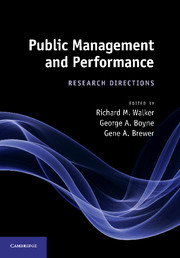Book contents
- Frontmatter
- Contents
- List of figures
- List of tables
- Notes on contributors
- 1 Introduction
- 2 Extending goal ambiguity research in government: from organizational goal ambiguity to programme goal ambiguity
- 3 Budgets and financial management
- 4 Organizational structure and public service performance
- 5 Red tape: the bane of public organizations?
- 6 Managerial networking, managing the environment, and programme performance: a summary of findings and an agenda
- 7 Public service motivation and performance
- 8 Organizational diversity and public service performance
- 9 Performance management: does it work?
- 10 Strategy: which strategic stances matter?
- 11 Methods
- 12 Conclusion: enriching the field
- Index
- References
3 - Budgets and financial management
Published online by Cambridge University Press: 05 July 2014
- Frontmatter
- Contents
- List of figures
- List of tables
- Notes on contributors
- 1 Introduction
- 2 Extending goal ambiguity research in government: from organizational goal ambiguity to programme goal ambiguity
- 3 Budgets and financial management
- 4 Organizational structure and public service performance
- 5 Red tape: the bane of public organizations?
- 6 Managerial networking, managing the environment, and programme performance: a summary of findings and an agenda
- 7 Public service motivation and performance
- 8 Organizational diversity and public service performance
- 9 Performance management: does it work?
- 10 Strategy: which strategic stances matter?
- 11 Methods
- 12 Conclusion: enriching the field
- Index
- References
Summary
Introduction
Money is the lifeblood of public service provision. It is where ‘everything of importance comes together’, because ‘[n]early everything we want government to do requires money’ (Kettl 1992: 1). Financial decisions invite conflict, because as White notes, ‘perhaps deciding the budget is not the most significant choice in any political system, but it is clearly the most important and controversial decision that is made again and again’ (White 1994: 113).
Given the central importance of money, the search for better government performance inevitably interacts with public financial management (PFM) systems. PFM systems represent a series of institutional routines that offer a powerful means to direct bureaucratic behaviour (Campos and Pradhan 1996). Most contemporary reforms that promise improved performance implicitly recognize this, advocating in various ways the reform of resource allocation and financial incentives. Ultimately, reform efforts that fail to align with financial processes represent the folly of rewarding A while expecting B (Kerr 1993).
Despite the centrality of PFM to reform and even the emphasis on resource allocation issues in most reforms, PFM has not always featured prominently in the nascent empirical public administration literature on public service performance. For this reason, this chapter takes a wide-ranging perspective on the relationship between PFM and performance. In addition, the chapter examines efforts to improve the performance of PFM systems. Such reforms are based on doctrinal claims, and scholarship remains split on the most basic questions: What is PFM performance? Why should PFM affect performance outcomes?
- Type
- Chapter
- Information
- Public Management and PerformanceResearch Directions, pp. 60 - 88Publisher: Cambridge University PressPrint publication year: 2010
References
- 4
- Cited by



